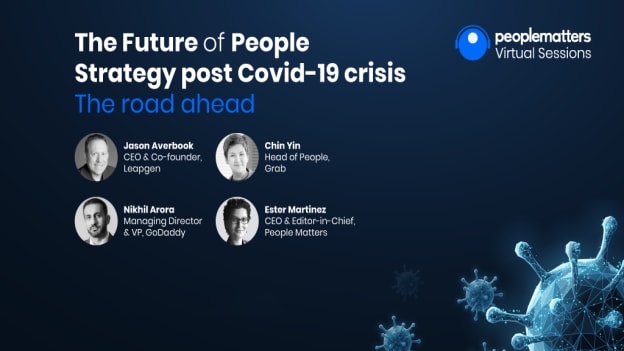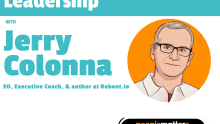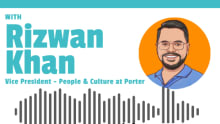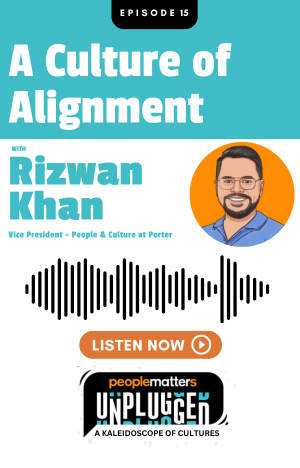People Matters CXO Virtual Talk Show: 'How will COVID-19 change people strategy forever’

The COVID-19 pandemic is holding the whole world for ransom, people’s experiences and expectations are forever changed and their attitudes and behaviours are changing as a result of the sudden shift from the normal. As businesses pivot to adjust to these evolving needs rapidly, the amount of impending change coming their way is intimidating. It is not hard to fathom that people strategy and the world of work is going to see a seismic shift post the crisis.
As the world emerges from the pandemic, what would have significantly changed is the way organizations behave and the way they communicate, design, sell and distribute products and services. There is an immediate need to support employees and businesses and relook at the role of the HR talent community to uplift organizations.
Transformation starts with people and we are at the intersection of opportunities and confusion. Here are some ways in which the People Strategy of the future is seeing a major shift:
How does work get done?
Jason: The next normal needs to be intentional, we have an amazing opportunity to transform. If you break down the word Transformation, the trans component is move. When we think about move, we are going to both move the concept of physical work and movement of work, as we look at the concept of digital movement. We realize we need to be more agile and succinct and when we talk about digital, the first component is mindset. The mindset has to be digital first. We are going to move how work gets done, we are going to move the physical and virtual components and blend those together and then we are going to move the mindset that says we are not going back.
Let's not go back to our processes. Let's make sure we use this as a reset, as a fresh start as leaders. Let’s not talk about the future of work, this is the new, what I call the Now of Work and it is an amazing opportunity.
What will be the kind of environment in terms of culture and alignment that we need to create for your employees?
Chin Yin: Employee productivity is going to see a major hit due to this whole upheaval and organizations will find it difficult to hold employees responsible for it amidst a pandemic. A non growth way of looking at productivity at work needs to be evaluated and implemented. Non-growth means there is less pressure and an opportunity to explore the utopian workweek. It will encourage two things, one could be more people returning back to the workforce because you spread it across more people, people get to live their lives hopefully in more productive ways and this might push us to a different kind of productivity from the economic point of view as well.
Another aspect that is likely to change drastically is how jobs are compensated and what are defined as truly useful and impactful jobs. Few things are more important than culture in the organization right now, at the root of the culture, there are two things companies need to focus on which are purpose and trust. Purpose keeps people doing what they do, if they believe what they are doing is right for the world. Second is Trust, how transparent you are with your communication. The more you trust, faster is the decision making and faster you can pivot. For any company to do well in the future from a culture and alignment perspective is really understanding that change happens very quickly.
This is the new future, pivoting every other day is what you should embrace and enjoy and this constant pivot is something that companies need to get people to get very used to.
How has the role of leadership evolved and what is the new normal when it comes to leadership expectations?
Nikhil: From a leadership point of view, you have to be missionary first and mercenary next which essentially means every leader will have to become a purpose driven leader. It is important for organizations to look at the mission statement and see how integrated it is with the employees. There will be digital disruptions and there will be acceleration of how work is done, the thing to watch out for is which one is an opportunity and risk and also how different it will be in different markets.
When employees are evaluated every year, are employees evaluated in accordance with the mission. It is important to have the employees to be aligned with it and accountable for it. Organizations also need to shift focus to the softer aspects of an employee’s journey in the organization, their mental, physical and psychological wellness and ensure the new normal includes taking care of the employee beyond paychecks. What’s sustaining people is how mentally well you can hold yourself. So as leaders we will have to make that much more prominent and executable. It is also important to connect with the community as leaders and how you go out and help , the hyperlocal model will emerge out of it which is both digital and physical.
Mobilizing efforts to bring up the hyperlocal model and make sure your employees are connected to it. Communication from the leader needs to be relooked at, it has to be consistent and quick.
What should the HR community action immediately and what should it adapt to in the long term?
Things that call for immediate action:
- Addressing anxious employees: The HR function needs to figure out what they can provide to employees from both personal and professional aspects. It is imperative to build positivity and confidence.
- Communication: The HR community needs to take a page from the Marketing function and their communication needs to hit the spot in terms of timeliness, relevance and tone. It is an opportunity to think about creative ways of communication and build trust through it.
- Focus on what’s important: The HR community needs to focus on what matters to the employees right now. The workforce is going through a lot of sudden change and it is a massive shock, this is the time to empower the workforce.
How will the HR community evolve in the long term?
- Relook at HR: It is an opportunity for the HR function to think why it exists, figure out the skilling part, how is productivity going to be measured, how will they be held accountable, how to train employees to be more self reliant. It is a threshold for HR to evaluate their role and the impact they have on the organization
- Go Hyperlocal: The decision making norms needs to be changed. Defining a new way to make decisions because we need to empower people to move faster on the ground, this is an opportunity to remove multiple levels of approval and for employees to perform independently. relook at compensation models in the future.
- Design right: We design the people function of the future for the workforce. And anything that we design is designed keeping the workforce at the center of it. A lot of digital tools have the ability to help usand blending how humans and machines can work together will be a big opportunity going forward.
What should the talent community start and stop doing to tide over the uncertainties today?
Nikhil: The HR function needs to stop treating this as a phase and assume this is permanent. The HR community needs to start enforcing normalcy and needs to understand how to get in the employee and customer ecosystem much more.
Chin Yin: It is important to start defining the normal that we are going back to here onwards and plan for the kind of a workplace you would want people to come back to. Stop creating policies for employees to make them fall in line but write them in a more human, trusting and respectful manner.
Jason: One of the most important opportunities is to use data to create an experience for people to get the best out of them and to focus on their strengths. This is a global event, happening all at once and everyone is coming back to a new start. The HR community should ensure that we go back to the people function that people desire to work with because they are driving the business forward, they are driving the competitive edge and making people the most productive they can be.
You can watch the session here:













